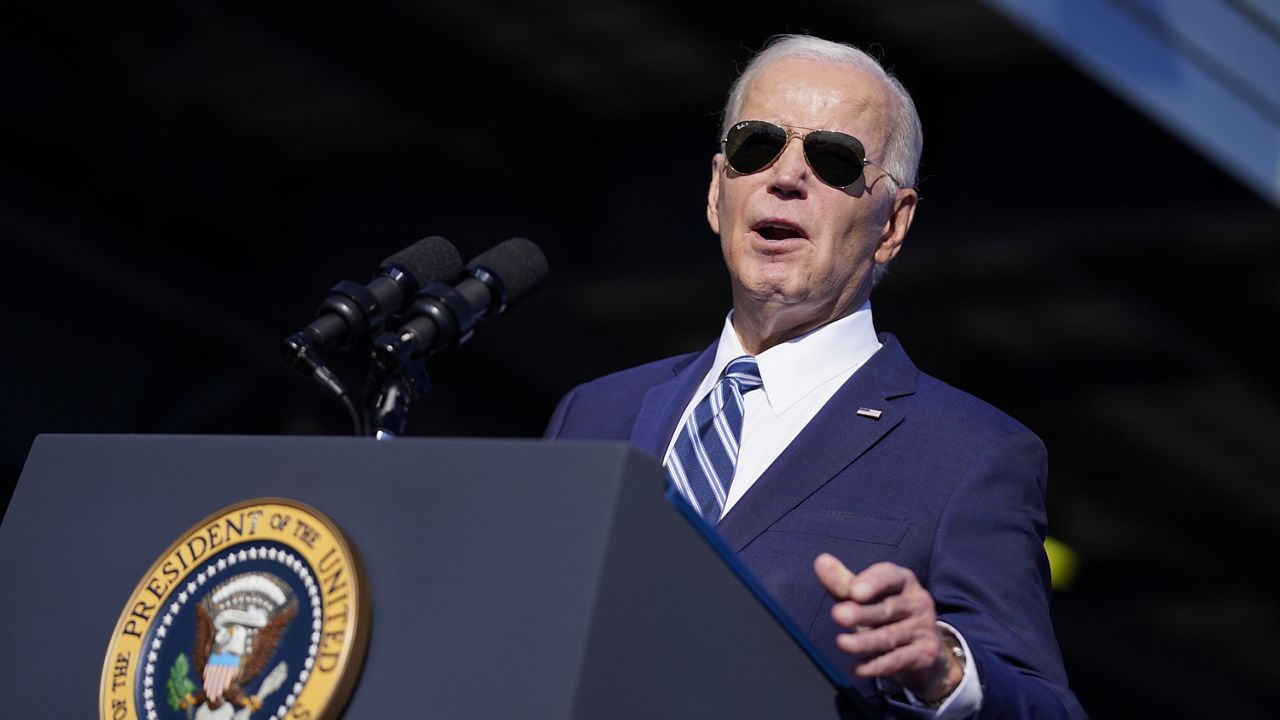Stopping down in familiar territory of battleground Pennsylvania on Friday, President Joe Biden announced a $7 billion investment in hydrogen in seven targeted regions of the country, billing it as “one of the largest advanced manufacturing investments in the history of this nation.”
“Hydrogen – you can power industries like the production of steel and aluminum. It is going to end up changing our transportation system, like trucks, rail, planes,” Biden declared on Friday.
In a call with reporters on Thursday, senior administration officials billed the investment into what they are calling “regional clean hydrogen hubs” as key to Biden’s economic and climate goals – particularly the goal of getting to net-zero emissions by 2050.
It was a sentiment Biden reiterated on Friday – emphasizing it will spur private investment, create jobs and reduce emissions.
“And folks, those hubs are about people coming together across state lines, across industries, across political parties to build a stronger, more sustainable economy and to rebuild our communities,” Biden said.
One official said that when the seven hubs are fully operational, they will reduce 25 million metric tons of carbon dioxide emissions yearly.
“Taken together, emission reductions from these hydrogen hubs will be the equivalent of taking 5.5 million gas powered vehicles off the road – 5.5 million,” Biden emphasized. “Across America, all of these hubs are anchored in the promise to local communities.”
Biden was joined by Energy Secretary Jennifer Granholm at Tioga Marine Terminal at the port in Philadelphia to make the announcement on Friday, putting the Scranton-born president back in one of his most frequently visited states – one he notably flipped in 2020 to win his first four years in the White House.
“And one thing before we get started – let's go Phillies,” Biden said, referencing the city’s Major League Baseball team, which wrapped up a 3-1 series win over the Atlanta Braves to advance to the National League Championship Series on Thursday. “You watch that game last night?”
The location of the announcement is purposeful, officials said, as the port will be a “critical end-user of hydrogen” in one of the regions called the Mid-Atlantic hub, which covers the states of Pennsylvania, Delaware and New Jersey. Officials said Philadelphia Gas Works, for instance, will supply hydrogen to refueling stations for heavy duty transport trucks and equipment at the port.
“That'll mean cleaner air since the equipment that runs on hydrogen produces fewer emissions than diesel,” Biden said of the project.
The other six hubs include: the California hydrogen hub; the Appalachian hydrogen hub, which includes West Virginia, Ohio and Pennsylvania; the Gulf Coast hydrogen hub in Texas; the Heartland hydrogen hub, which includes Minnesota, North Dakota and South Dakota; the Midwest hydrogen hub, encompassing parts of Illinois, Indiana and Michigan; and the Pacific Northwest hydrogen hub including Washington, Oregon and Montana.
Each hub, officials said, will play to its existing strengths. The California hub, for instance, is set to “leverage the Golden State’s leadership in clean energy technology to produce hydrogen exclusively from renewable energy and biomass,” according to the White House. The Heartland hub, on the other hand, will seek to “help decarbonize the agricultural sector’s production of fertilizer.”
Included in the hubs are “broad clusters” of both private and public entities that produce and consume hydrogen in that particular geographic area.
The $7 billion investment is part of $9.5 billion set aside in the Bipartisan Infrastructure Law to drive clean energy research, production and delivery, with the goal of accelerating “the domestic market for low-cost clean hydrogen.” Officials said they hope Friday’s announcement will kickstart “a national network of clean hydrogen production.”
“It's a big first step,” one senior administration official said, adding in implementing Biden’s key legislation, they are seeking to enact programs that are “private sector led, but government enabled and government accelerated.”
“I found that when the government invests in the needs of the American people –invest in America and the American people – guess what? The private sector jumps on real quick,” Biden said on Friday, adding he has “asked CEOs this question repeatedly.”
Biden said Friday’s announcement will spur more than $40 billion in private investment, although administration officials noted on Thursday’s call that number does not represent “firm commitments” from companies and rather reflects what private sector entities say they expect to invest.
Officials also highlighted the jobs the announcement is expected to create, both construction and permanent jobs. Unions were involved in the creation of several hubs, officials said, with two committing to requiring labor agreements and one set to negotiate such agreements.
The White House is billing Friday’s announcement as part of the administration’s third “Investing in America” tour, in which top officials are traveling the country seeking to sell the American public on the president’s economic agenda, branded “Bidenomics," as the president seeks another four years in the Oval Office.
“Today's announcement is transformational and enjoys a long line of transformational adjustments we made just since I took office,” Biden said. “And as a result, I truly believe this country is about to take off. Because for the first time in a long time, we're actually investing in America.”



